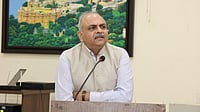When Guneet Monga walked up the Kodak Theatre at the 95th Academy Awards as the producer of the best documentary short film, The Elephant Whisperers, she kept her acceptance speech short, but it was a loud shout-out to independent filmmaking in India. Her win has heralded a new beginning for Indian cinema.
Monga, who is the founder of Sikhya Entertainment, has co-produced critically acclaimed films such as Gangs of Wasseypur, The Lunchbox and Masaan, becoming one of the most influential producers in the independent circuit. Her filmography does not fall into the mainstream category—she is an ardent supporter of what is called parallel cinema. But what elevates the significance of her win is the timing and the format.
Though some Indians before Monga had their fair share of global fame, no film produced by an Indian had ever won the Oscar. This is for a film industry which boasts production of maximum films in the world, even surpassing Hollywood. Experts attribute this to the poor exposure received by independent filmmakers in India. However, the tables seem to have turned in their favour following the rise of over-the-top (OTT) platforms.
Today, Indian filmmakers enjoy the liberty of creating films not just for the audience at home but for the whole world. While this has opened many doors for independent filmmakers in the country, one can also argue that the competition for global recognition has peaked. This widens the implications for filmmakers, with the likes of Monga funding arthouse cinema. The Oscar has just emboldened her to back films that so far remained wrapped in screenplays.
The consequence of Monga’s win is the impact it will have on documentary filmmaking in India, a format that is mostly ignored in the absence of producers. While OTT platforms have invigorated the scene for documentary makers, Monga’s win will give them the much-needed impetus.
Global Recognition
The repercussions of an Oscar win go far beyond individual glory. A notable example being the wave of South Korean cinema that swept the world once Parasite won the Oscar in 2020. As Bong Joon-ho’s comedy-thriller became the first non-English film to win best picture, it not just created history but a cultural breakthrough for South Korea that had been ploughing investments into Hallyuwood (a popular reference to the South Korean film industry). And in no time K-pop, K-drama and K-cinema became a global rage.
Noteworthy Korean cinema had been doing the rounds of international festival circuits for at least two decades before Parasite, but a nod from the Academy was validation that the K-storm had arrived. OTTs played no small part in this, with Netflix ensuring Squid Games topped global charts for weeks.
This sent a message to filmmakers that the world was changing, and Hollywood could no longer decide what people are going to watch.
India has always been home to content-rich films, thanks to its diverse-language film industry. But the world seldom took note of it. Regarded as one of India’s greatest filmmakers, Satyajit Ray was presented with an Academy Honorary Award only when he was lying on his death bed. In 1992 Ray, while accepting the award, reflected on a whole class of independent filmmakers who went unnoticed. Now with OTT coming into play, Monga, with her win, represents a better future for the makers.
“This is India’s first ever film to win,” said Monga at a media interaction after accepting the award at the Oscars. “Largely for Indian cinema, I think we just got started. It is a good run-up. We share this with all the documentary filmmakers, the aspiring dreams of Indian filmmakers and I am sure, I hope that this empowers more filmmakers to go tell their stories.”
Like they say, it takes days of hard work to achieve a night’s success. “For me, it is 15 years of producing independent films, and Oscars and any award, all add up. All these rewards are beautiful, but change is a slow and everyday process. You may feel that after a day’s work that you have not done much and not even moved a stone, but after a decade and a half, I think that I have moved a mountain. But yes, it took that long,” Monga said, while accepting another award at an event this year.
Her role as a filmmaker is of even greater importance in a country which has seen only a handful female filmmakers. For this, The Hollywood Reporter voted her as one of the top 12 women achievers in the global entertainment industry.
To associate with independent films at a time when parallel cinema had only a few takers in India was a tough call for Monga 15 years back. It was a time when multiplexes did not bring in the entertainment revolution that many were betting on, margins were shrinking and few wanted to take risks with the Indian audience, largely known to be formula- and star-driven. Even corporates entering the film business did little to push independent filmmakers. But Monga has managed to move the needle and open up an audacious future for Indian filmmakers. So, grab your popcorn and enjoy the show.
































